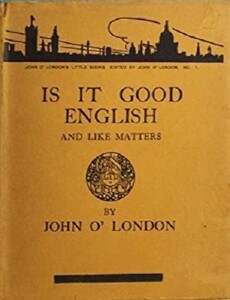Today, one of the commonest colloquial uses of the word ‘ case ‘, as in ‘This not the case’ is, according to one writer on correct grammar, an incorrect use of the word. Nearly a hundred years ago John O’London made his case, as it were, but this use of the word is still common. Let Mr O’London explain:-
‘The word ‘ case’ is a capital example of the words which, rightly used, mean something, but, wrongly, nothing at all. Mr R. W. Chapman, in…The Portrait of a Scholar and Other Essays writes: ‘ Case and instance are the commonest and most dangerous of a number of parasitic growths which are the dry rot of syntax’.
‘The word case implies a conjunction of affairs, an opposition of interests, a relation of circumstances to one another. Thus you may write of ‘ a case of conscience.’ But we are not to write, ‘ That is not the case, when all we mean is’ That is not so’; for a case is a position of things, relative to the things themselves or to the way in which they affect men. We shall find the word correctly used in the tenth verse of the nineteenth chapter of the Gospel of St. Matthew, ‘ His disciples say unto Him, If the case of the man be so with his wife, it is not good to marry.’ The word is used with correctness by the Friar in ‘ Much Ado about Nothing ‘ when he is advising Leonato how to act for the vindication of his daughter: ‘ Pause awhile and let my counsel sway in this case.’ But, as Mr Chapman points out, it is wrong to write, ‘ It is not the case that Napoleon died of a broken heart,’ because no case has been stated.’
Up and down.
Today we casually use the words ‘up’ and ‘down’ in conjunction with a destination without really being aware of why we choose one or the other of these two words. In 1924 a reader asked Mr O’ London what was the significance of this choice of word. ‘ Should ‘up’ be used when one is going to a larger town or is it geographically used—i.e. if the place be north or south of your position?’ Here is Mr O’ London’s reply:-
‘I do not think that ‘ up’ or ‘down have any original association with north or south. These terms originated in railway, or coaching parlance, and are governed by the relative and conventional importance of the two ends of a journey. Thus in railway speech, a Manchester man would say ‘up to London’, and a London man ‘ down to Manchester.’ But whether a Manchester man would say, in practice, ‘ up ‘ to Birmingham may be a solemn question. Personally, I should not say ( in London) that I was going ‘ down to Liverpool’, but ‘ up to Liverpool.’ ‘ Down to Liverpool’, though correct in railway language, seems a thought glib and pompous. I should consider it an impertinence to announce to a Scot my intention to go ‘ down to Edinburgh,’ even though Edinburgh is on the ‘ down’ line from London.’
News
Today, the word ‘ news ‘ is always treated as singular, rather than plural, but in 1924 Mr O’ London did question the status of this word. He declared that in olden times the word was ‘ often plural ‘, as in Dryden: ‘ The amazing news of Charles at once were spread.’ Shelley could also write ‘ There are bad news from Palermo,’ and Scott makes one of his characters say, ‘ Tell me, are your news of a sad or pleasant complexion?’ So late a writer as Nathaniel Hawthorne wrote, ‘News have come to me respecting a dear friend’; yet so early one as Milton makes ‘ news’ singular as we make it today: ‘ Evil news rides post, while good news baits.’
Mr O’ London doesn’t explain why Hawthorne ( ) makes news plural, while John Milton ( ) makes it singular. One could only guess that Milton was interested in modern ideas and idioms and therefore saw the plural ‘ news ‘ as archaic, while Hawthorne wrote historical novels in which a plural ‘ news’ seemed appropriate for the times.
No and Not any.
One of Mr O’London’s readers told him that he had been admonished for using such phrases as ‘ I have no knowledge,’ ‘ I have received no letters,’ ‘There is no doubt,’ etc., on the ground s that this use of no is ungrammatical and illogical, and that the right expression is not any….
‘This ludicrous objection’, Mr O’London writes.’ arises, I suppose, from the irrelevant thought that we do not say ‘I have yes knowledge,’ etc, and from forgetting that there are several ‘no’s’ in the language with different meanings. ‘No‘ actually means ‘ not any—-as in Isaiah:
‘ There is no beauty that we should desire him’; as in Shakespeare: ‘ And then they say, no spirit dare stir abroad; then no planets strike, no fairy tales’; as in Keats: ‘ No hungry generations tread thee down’ ; and as in all our literature, world without end. ‘ No’ is here a contraction of ‘ no one’ and ‘not one,’ and by consequences means ‘ not any.’ Chaucer uses ‘no before a consonant, as in ‘ no man,’ and ‘none’ before a vowel ( for euphony) as in ‘ noon apothecarie,’ i.e., no apothecary.
- M. Healey

